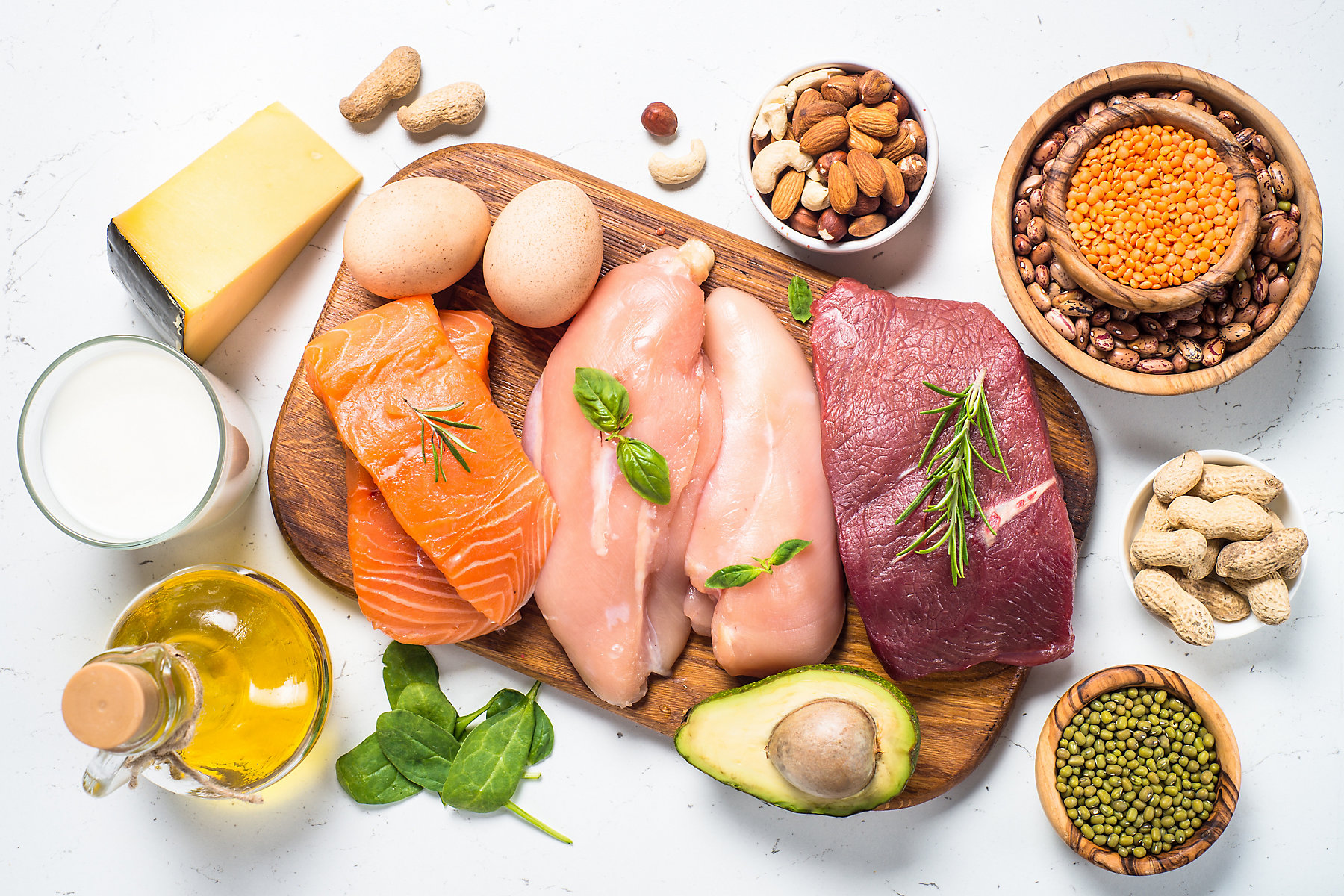Protein and Recovery: Optimizing Muscle Repair

Protein is the cornerstone of muscle growth and repair. Consuming adequate protein is essential for maximizing muscle protein synthesis, the process by which new muscle tissue is formed. To achieve optimal muscle growth, it is crucial to incorporate high-quality protein sources into your diet.
Animal-Based Protein Sources
Animal-based protein sources are generally considered the most complete, as they contain all the essential amino acids required for muscle growth. Some of the top animal-based protein sources include:
Lean meats: Chicken, turkey, beef, and pork are excellent sources of protein and provide a range of essential amino acids.
Fish: Salmon, tuna, and mackerel are rich in protein and omega-3 fatty acids, which have anti-inflammatory properties.
Eggs: Whole eggs are a complete protein source and contain essential nutrients like choline and lutein.
Dairy products: Milk, yogurt, and cheese are good sources of protein and calcium, which is important for bone health.
Plant-Based Protein Sources

While animal-based protein sources are often preferred, plant-based protein sources can also contribute to muscle growth. However, it is important to note that plant-based proteins are often incomplete, meaning they do not contain all the essential amino acids. To ensure adequate intake, it is recommended to combine different plant-based protein sources. Some of the top plant-based protein sources include:
Legumes: Beans, lentils, and chickpeas are excellent sources of protein and fiber.
Tofu and tempeh: These soy-based products are complete protein sources and provide a range of essential amino acids.
Nuts and seeds: Almonds, walnuts, and chia seeds are good sources of protein and healthy fats.
Quinoa and brown rice:These whole grains provide protein and complex carbohydrates, which are essential for energy production.
Timing and Intake
The timing and intake of protein are also important factors to consider. It is recommended to consume protein throughout the day, especially after workouts, to maximize muscle protein synthesis. Aim for a protein intake of 1.6-2.2 grams per kilogram of body weight per day.
Incorporating high-quality protein sources into your diet is essential for boosting muscle growth. By consuming a combination of animal-based and plant-based protein sources, you can ensure that you are providing your body with the necessary nutrients to build and repair muscle tissue. Remember to consider the timing and intake of protein to optimize your results.
Protein Intake Recommendations for Muscle Growth
Protein is an essential macronutrient for muscle growth and repair. Consuming adequate protein is crucial for individuals seeking to maximize their gains. This article explores the top protein sources that can help accelerate muscle growth.
Animal-Based Protein Sources
Animal-based protein sources are highly bioavailable, meaning they are easily absorbed and utilized by the body. Some of the best animal-based protein sources include:
Lean meats: Chicken, turkey, fish, and lean beef are excellent sources of protein with a high biological value.
Eggs: Whole eggs are a complete protein source, containing all essential amino acids.
Dairy products: Milk, yogurt, and cheese provide high-quality protein along with calcium and other essential nutrients.
Plant-Based Protein Sources
Plant-based protein sources are becoming increasingly popular due to their health benefits and environmental sustainability. While they may not be as bioavailable as animal-based proteins, they can still contribute significantly to muscle growth. Some top plant-based protein sources include:
Legumes: Beans, lentils, and chickpeas are excellent sources of protein and fiber.
Tofu and tempeh: These soy-based products are complete protein sources with a similar amino acid profile to animal proteins.
Quinoa: This ancient grain is a complete protein source and also provides fiber and essential minerals.
Protein Intake Recommendations
The recommended daily protein intake for muscle growth varies depending on factors such as body weight, activity level, and training intensity. However, a general guideline is to consume 1.6-2.2 grams of protein per kilogram of body weight per day.
Timing of Protein Intake
In addition to the amount of protein consumed, the timing of protein intake is also important. Consuming protein before and after workouts can help maximize muscle protein synthesis and recovery.
Consuming adequate protein from high-quality sources is essential for muscle growth and repair. By incorporating the top protein sources discussed in this article into their diet, individuals can support their fitness goals and achieve quick gains. It is important to consult with a healthcare professional or registered dietitian to determine the optimal protein intake and timing for individual needs.
Protein Supplementation for Enhanced Gains
Protein is an essential macronutrient for muscle growth and repair. Consuming adequate protein is crucial for individuals seeking to enhance their muscle mass and strength. This article explores the top protein sources that provide quick gains for muscle development.
Whey Protein:
Whey protein is a fast-digesting protein derived from milk. It is highly bioavailable, meaning it is easily absorbed and utilized by the body. Whey protein is rich in essential amino acids, including leucine, which plays a key role in stimulating muscle protein synthesis.
Casein Protein:
Casein protein is another milk-derived protein that digests slowly. This sustained release of amino acids provides a steady supply of nutrients to the muscles over several hours. Casein protein is particularly beneficial for nighttime consumption, as it helps prevent muscle breakdown during sleep.
Egg Protein:
Egg protein is a complete protein that contains all the essential amino acids. It is highly digestible and has a high biological value, indicating its efficiency in promoting muscle growth. Egg protein is a versatile source that can be consumed in various forms, such as whole eggs, egg whites, or egg protein powder.
Soy Protein:
Soy protein is a plant-based protein that is a good alternative for vegetarians and vegans. It is rich in isoflavones, which have antioxidant and anti-inflammatory properties. Soy protein has been shown to be effective in promoting muscle growth and reducing muscle soreness.
Pea Protein:
Pea protein is another plant-based protein that is hypoallergenic and easy to digest. It is a good source of essential amino acids, including lysine, which is often limiting in plant-based diets. Pea protein has been found to be comparable to whey protein in terms of muscle growth potential.
When to Consume Protein:
Consuming protein throughout the day is important for optimal muscle growth. Aim to distribute protein intake evenly over meals and snacks. It is particularly beneficial to consume protein within 30-60 minutes after a workout to maximize muscle protein synthesis.
Incorporating these top protein sources into your diet can significantly enhance muscle growth and recovery. By providing a steady supply of essential amino acids, these proteins stimulate muscle protein synthesis and reduce muscle breakdown. Whether you are a seasoned athlete or just starting your fitness journey, consuming adequate protein is crucial for achieving your muscle-building goals.
The Role of Protein Timing in Muscle Growth
Protein plays a crucial role in muscle growth and repair. Consuming adequate protein throughout the day is essential for maximizing muscle protein synthesis, the process by which new muscle tissue is created. However, the timing of protein intake can also significantly impact muscle growth.
Optimal Protein Timing
Research suggests that consuming protein within 1-2 hours after resistance training is optimal for stimulating muscle protein synthesis. This window of opportunity is known as the “anabolic window.” During this time, the body is primed to absorb and utilize protein for muscle growth.
Top Protein Sources for Quick Gains
To maximize muscle growth, it is important to choose protein sources that are quickly digested and absorbed. Here are some of the best options:
Whey protein: Whey is a fast-digesting protein derived from milk. It is rich in essential amino acids and has a high biological value, making it an excellent choice for post-workout recovery.
Egg whites: Egg whites are another high-quality protein source that is quickly digested. They are low in fat and calories, making them a lean option for muscle building.
Lean meats: Lean meats such as chicken, turkey, and fish are good sources of protein that are relatively easy to digest. They also provide essential vitamins and minerals.
Greek yogurt: Greek yogurt is a thick, creamy yogurt that is high in protein and low in carbohydrates. It is a versatile food that can be consumed as a snack or added to smoothies and other dishes.
Casein protein: Casein is a slow-digesting protein that can provide a sustained release of amino acids over several hours. It is a good choice for bedtime or between meals to prevent muscle breakdown.
Incorporating Protein into Your Diet
To ensure adequate protein intake for muscle growth, aim to consume 1.6-2.2 grams of protein per kilogram of body weight per day. This can be achieved through a combination of whole foods and protein supplements.
Distribute your protein intake evenly throughout the day, with a focus on consuming protein within 1-2 hours after resistance training. By following these guidelines, you can optimize protein timing and maximize muscle growth.
Remember, protein is just one aspect of a comprehensive muscle-building plan. It is equally important to engage in regular resistance training, get adequate rest, and maintain a healthy overall diet. By combining these elements, you can create the ideal conditions for building lean muscle and achieving your fitness goals.
Plant-Based Protein Options for Muscle Gain
Protein is an essential macronutrient for muscle growth and repair. While animal-based proteins have long been considered the gold standard, plant-based protein sources offer a viable alternative for those seeking to build muscle mass.
Soy Protein:
Soy protein is a complete protein, meaning it contains all nine essential amino acids. It is also a rich source of isoflavones, which have been shown to have anti-inflammatory and antioxidant properties. Studies have demonstrated that soy protein can effectively promote muscle growth and strength gains.
Pea Protein:
Pea protein is another complete protein that is highly digestible and hypoallergenic. It is a good source of branched-chain amino acids (BCAAs), which are essential for muscle protein synthesis. Research suggests that pea protein can stimulate muscle growth and recovery after resistance training.
Brown Rice Protein:
Brown rice protein is a hypoallergenic and gluten-free protein source. It is not a complete protein, but it can be combined with other plant-based proteins to create a complete amino acid profile. Brown rice protein has been shown to support muscle growth and reduce muscle soreness.
Hemp Protein:
Hemp protein is a complete protein that is rich in omega-3 fatty acids. It is also a good source of fiber and minerals. Studies have found that hemp protein can promote muscle growth and improve recovery from exercise.
Quinoa Protein:
Quinoa protein is a complete protein that is high in fiber and iron. It is also a good source of antioxidants. Research suggests that quinoa protein can support muscle growth and reduce inflammation.
Tips for Maximizing Protein Intake:
Aim for 1.6-2.2 grams of protein per kilogram of body weight per day.
Distribute protein intake evenly throughout the day.
Combine plant-based protein sources to create a complete amino acid profile.
Consider using protein supplements if you struggle to meet your protein needs through diet alone.
Plant-based protein sources offer a nutritious and effective way to support muscle growth. By incorporating these protein-rich foods into your diet, you can fuel your muscles for optimal performance and recovery. Remember to consult with a healthcare professional or registered dietitian for personalized advice on your protein intake and overall nutrition plan.
Essential Amino Acids for Muscle Building

Protein is the cornerstone of muscle growth and repair. Consuming adequate amounts of high-quality protein is essential for maximizing muscle protein synthesis, the process by which new muscle tissue is formed. However, not all protein sources are created equal. Some provide a more complete amino acid profile, which is crucial for optimal muscle growth.
Essential Amino Acids for Muscle Building
Essential amino acids (EAAs) are those that the body cannot produce on its own and must be obtained from food. Of the 20 amino acids, nine are considered EAAs for muscle growth: histidine, isoleucine, leucine, lysine, methionine, phenylalanine, threonine, tryptophan, and valine.
Top Protein Sources for Quick Gains
To achieve quick muscle gains, it is important to consume protein sources that are rich in EAAs. Here are some of the best options:
Whey Protein: Whey is a fast-digesting protein derived from milk. It is an excellent source of EAAs, particularly leucine, which is a key regulator of muscle protein synthesis.
Casein Protein: Casein is a slow-digesting protein also found in milk. It provides a sustained release of amino acids over several hours, promoting muscle growth throughout the day.
Egg Whites: Egg whites are a complete protein source that is rich in EAAs. They are also low in fat and calories, making them an ideal choice for those looking to gain muscle without adding excess weight.
Lean Beef: Lean beef is a good source of protein and EAAs, including leucine. It is also a rich source of iron, which is essential for oxygen transport to muscles.
Chicken Breast: Chicken breast is another lean protein source that is high in EAAs. It is also a good source of niacin, which is involved in energy metabolism.
To maximize muscle growth, aim to consume 1.6-2.2 grams of protein per kilogram of body weight per day. This can be achieved by incorporating protein-rich foods into every meal and snack. Consider using protein supplements, such as whey or casein protein powder, to supplement your dietary intake.
Consuming adequate amounts of high-quality protein is essential for boosting muscle growth. By choosing protein sources that are rich in essential amino acids, you can optimize muscle protein synthesis and achieve your fitness goals faster. Remember to incorporate protein into your diet consistently and consider using protein supplements to support your muscle-building efforts.
Top Protein Sources for Rapid Muscle Growth
Protein is the cornerstone of muscle growth and repair. Consuming adequate protein is essential for maximizing muscle gains, especially for individuals engaged in intense physical activity. This article explores the top protein sources that provide the necessary building blocks for rapid muscle growth.
Animal-Based Protein Sources
Animal-based protein sources are highly bioavailable, meaning they are easily absorbed and utilized by the body. Some of the best animal-based protein sources include:
Lean Beef: Beef is a rich source of protein, iron, and creatine, all of which are essential for muscle growth.
Chicken Breast: Chicken breast is a lean protein source that is low in fat and calories, making it an excellent choice for those looking to gain muscle without adding excess weight.
Fish: Fish, such as salmon, tuna, and mackerel, are excellent sources of protein and omega-3 fatty acids, which have anti-inflammatory properties that can support muscle recovery.
Eggs: Eggs are a complete protein source, meaning they contain all the essential amino acids needed for muscle growth.
Plant-Based Protein Sources
While animal-based protein sources are often considered the gold standard, plant-based protein sources can also be effective for muscle growth. Some of the top plant-based protein sources include:
Soy Protein: Soy protein is a complete protein source that is comparable to animal-based protein in terms of its amino acid profile.
Pea Protein: Pea protein is another complete protein source that is hypoallergenic and easily digestible.
Brown Rice Protein: Brown rice protein is a good source of protein and fiber, making it a filling and nutritious option.
Quinoa: Quinoa is a complete protein source that is also high in fiber and antioxidants.
Timing and Quantity
The timing and quantity of protein intake are crucial for maximizing muscle growth. It is recommended to consume protein throughout the day, with a focus on consuming 20-30 grams of protein within 30 minutes of completing a workout. This helps to initiate muscle protein synthesis, the process by which muscle tissue is repaired and rebuilt.
Conclusion
Consuming adequate protein from high-quality sources is essential for rapid muscle growth. By incorporating these top protein sources into your diet and following proper timing and quantity guidelines, you can provide your body with the necessary building blocks to build and maintain lean muscle mass. Remember to consult with a healthcare professional or registered dietitian for personalized advice on your protein intake and overall nutrition plan.







1 Comment
Pingback: 5 Common Muscle Food Mistakes You Should Avoid -